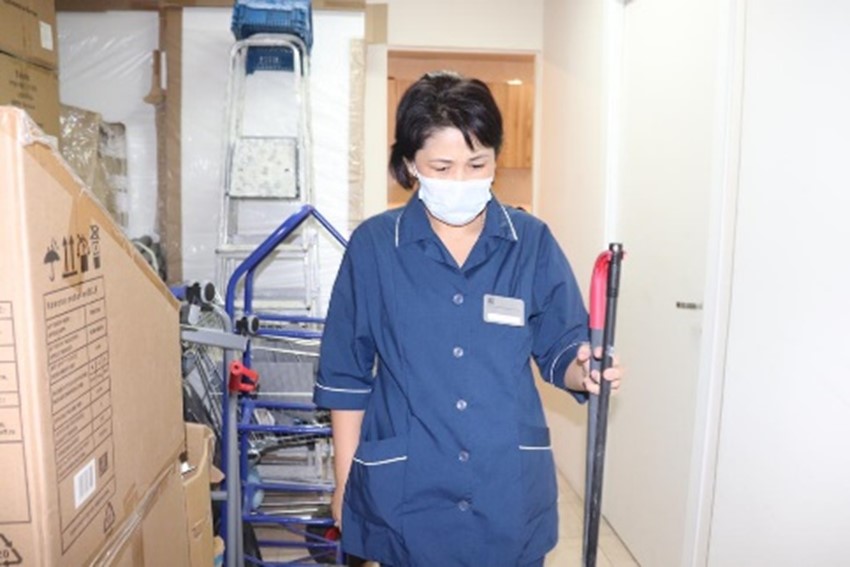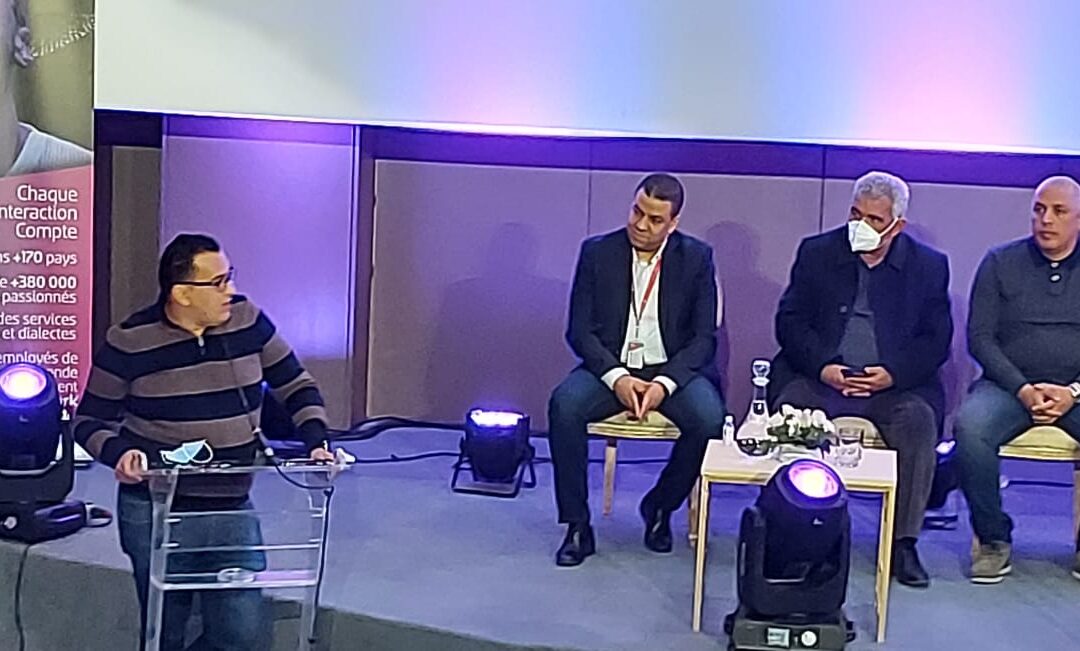
Mar 3, 2022
Thousands of workers in Mexico recently formed an independent union at a GM auto plant in Silao, in central Mexico, voting out a corporate-supported union that did not operate in their interest. On the latest episode of The Solidarity Center Podcast, Maria Alejandra Morales Reynoso, general secretary of SINTTIA, the union that now represents the workers, tells why this victory is a milestone for many Mexican workers who are forced to be part of sham unions. (En español)
Morales shares how workers at the Silao plant stood strong in the face of widespread corruption, laws tilted against them and incredible pressure to cast their vote for a protection union that did the bidding of the company.
The union victory “gave people hope, hope that it was possible to represent workers freely,” she says. “We proved it’s possible to get organized and to fight for our rights and to leave behind the fear that we’re going to lose our jobs.”
“It takes courage to take on an entire, entrenched, corrupt system. Yet the workers in Silao did just that, inspiring workers all over the world,” says Podcast host and Solidarity Center Executive Director Shawna Bader-Blau.
“And they did so at one of the biggest companies in Mexico, with more than 6,000 workers. This is living proof that worker power and global solidarity is a powerful voice and force for democracy and worker and human rights. When workers come together, we cannot be stopped.”
Catch More Solidarity Center Podcast Episodes!
Listen to this all Solidarity Center episodes here or at Spotify, Amazon, Stitcher, Castbox or wherever you subscribe to your favorite podcasts.
Download recent episodes:
The Solidarity Center Podcast, “Billions of Us, One Just Future,” highlights conversations with workers (and other smart people) worldwide shaping the workplace for the better.

Mar 2, 2022
In Nigeria—where 93 percent of working people toil in the informal economy for low wages, unprotected by labor law and without social services such as pensions and healthcare—app-based workers are fighting for their rights.
With Solidarity Center support, today the Federation of Informal Workers of Nigeria (FIWON), the National Union of Professional APP-Based Transport Workers (NUPA-BW) and the Professional E-Hailing Drivers and Private Owners of Nigeria (PEDPA) launched a joint campaign for formal recognition and adequate representation for all, regardless of classification.
“A worker is a worker,” says Solidarity Center Nigeria Country Program Director Sonny Ogbuehi. “And all working people have the right to join together to secure the decent jobs and fair wages they deserve.”
During the early part of the pandemic, employment in Nigeria plummeted. Although employment has since rebounded, most newly created jobs are precarious and the cost of living has skyrocketed. Many young people, including those who graduated university into the pandemic, are now employed in the gig economy or other informal-sector jobs because no formal-sector work is available.
Following a Supreme Court decision in the United Kingdom classifying Uber drivers as workers rather than independent contractors, NUPA-BW drivers in May last year announced a class action suit against two international app-based ridesharing companies for compensation of unpaid overtime and holiday pay, pensions, social security, as well as union recognition. A month prior, drivers in Lagos embarked on a strike for an immediate increase in fares to compensate for the cost of goods and services that, PEDPA said, had increased by more than 200 percent without a commensurate fare increase.
“We want [ride-share companies] to respect the Nigerian constitution and labor law,” says NUPA-BW President Ayoade Ibrahim.
The joint campaign’s demands include full worker and union rights; provision of social protection programs, including pensions, adequate and affordable healthcare, and disability care; provision by the employer of basic workplace infrastructure such as electricity, water and toilets; improved safety and security measures; and worker input into pricing.
The campaign will:
- Support a new NUPA-BW case at the national industrial court for classification of app-based drivers as workers
- Produce a weekly call-in radio program to educate the public about the challenges faced by workers employed by app-based companies and other informal-sector workers
- Facilitate platform workers efforts to organize and support their efforts to advocate for their rights with government and policy makers, employers and within the public domain.
Some 2 billion people work in the informal sector globally, as domestic workers, taxi drivers and street vendors, many of them women. This number has only increased during the COVID-19 pandemic. Informal-economy work now comprises most jobs in many countries and is increasing worldwide. Although informal-economy workers can create up to half of a country’s gross national product, most have no access to health care, sick leave or support when they lose their jobs, and they have little power to advocate for living wages and safe and secure work. The Solidarity Center is part of a broad-based movement in dozens of countries to help workers in the informal economy come together to assert their rights and raise living standards.
Feb 28, 2022
“Dave Welsh, country director for Thailand and Myanmar of the Solidarity Center, spoke with The Diplomat’s Luke Hunt about growing support for independent trade unions as the COVID-19 pandemic continues to punish regional economies, forcing businesses to restructure–which all too often leaves workers stranded without compensation.”

Feb 24, 2022
A study conducted by Insan-Leilek, a Kyrgyz migrant worker foundation, and the Trade Union of Migrants of the Kyrgyz Republic documents abuses suffered by many who migrate to Russia to earn their livelihoods as nannies, adult caregivers, cooks, cleaners and live-in domestic workers. An estimated 750,000 Kyrgyz people have migrated to Russia for work; official Kyrgyz government data estimates that half that number are women.
“We are invisible people,” says 34-year-old survey respondent and domestic worker Almagul. (Her last name is withheld to protect her livelihood and personal safety.)
“The Problems of Informal Domestic Workers,” reflects the experiences of 300 Kyrgyz migrant domestic workers, from whom 24 were selected for in-depth interviews by two migrant worker experts. Respondents’ jobs were in the Russian cities of Kazan, Moscow, Novosibirsk, Samara and Yekaterinburg.
The study reveals a wide range of employment abuses among the mostly female domestic workers who were surveyed, including sexual harassment and violence, other forms of physical and emotional abuse, unpaid hours, excessive workloads, denial of time off and wage theft.
More than 80 percent of the female survey participants who provided in-depth interviews reported sexual harassment at the hands of their employers. Of this group, almost 4 percent had experienced severe sexual violence, including rape, while 25 percent were subjected to indecent touching that included unwanted touching of intimate body parts. More than 30 percent of those reporting sexual harassment and violence said they could not ask anyone for help or support and, of this number, 7 percent attempted suicide. More than 70 percent of those providing in-depth interviews said they were often beaten, allegedly for laziness, and that they can rarely go out.
Two survey participants reported having become surrogate mothers for their employers without a written agreement or fair compensation.
Almost 90 percent of the larger group surveyed (300 respondents) were working without a formal contract because they had secured their jobs through personal connections. Such workers are vulnerable to unregulated work in which hours, pay, duties and conditions are determined at the whim of the employer, some of whom are unscrupulous and exploitive.
“I worked 24 hours a day, and I looked after the children, cooked, did the laundry. Weekends were out of the question,” reports Miraida about a job she held in Russia when she was 18.
Kyrgyz domestic workers in Russia provide an average of 10 hours of work per day, a survey of the larger group of 300 found. Of these, those who live in an employers’ home are working an average of more than 12 hours per day. More than 40 percent said they perform additional services that were not agreed with the employer at the time of hiring, without adjusted compensation.
Respondents were recruited for the survey through Trade Union of Migrants of the Kyrgyz Republic WhatsApp groups and Insan-Leilek diaspora organizations and migrant communities. In-depth interviews were conducted online and over the phone.
Russia is the main destination for approximately 750,000 of Kyrgyzstan’s labor migrants. Official data on the percentage of migrant women employed in domestic work in Russia does not exist.
Insan-Leilek foundation and the Trade Union of Migrants of the Kyrgyz Republic are actively engaged in anti-trafficking programs in Kyrgyzstan, with Solidarity Center support, including last year’s “100 Days Against Trafficking in Persons” youth campaign.

Feb 15, 2022
Some 3,800 call center workers at Teleperformance in Tunisia won a 13.8 percent wage increase and other key contract gains after staging actions and planning a strike in Tunis, the capital, and other cities.
Represented by the Tunisia General Labor Union (UGTT), the workers negotiated an additional three days paid sick leave and increases in funding for tuition, food vouchers and their social welfare fund, which is administered by the government and includes pensions, maternity benefits, medical benefits and unemployment compensation.
The contract goes into effect immediately for the workers, 80 percent of whom are young and the majority of whom are women.
Teleperformance, a France-based multinational with more than 380,000 employees in 83 countries, made $372 million in profits in 2020. Yet poor and unsafe working conditions at its operations in several countries led workers in France, Morocco and Tunisia to strike last year. Workers say they were not paid if they refused to work without sufficient personal protective equipment, including masks, and pointed to inadequate social distancing and lack of sanitary measures for shared headphones and workspaces.
The UGTT, which now represents 12,000 workers at Teleperformance and other tech centers, has helped 5,000 tech center workers form unions in the past two years.




